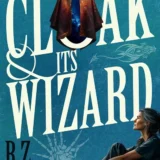 The Name of the Wind by Patrick Rothfuss is one of those books that apparently everyone besides me has read. From my Internet friends to attorneys at work, people praise this book to me and looked horrified when I told them I hadn’t read it. Even major corporations are bidding over the right to turn it into a television series. Hype, however, is a dangerous thing and I was concerned the book would not live up to the high standards people had built for it in my mind. Nevertheless, because of the aforementioned bidding war, I decided now would be a good a time as any to check out The Name of the Wind and see what I thought of it.
The Name of the Wind by Patrick Rothfuss is one of those books that apparently everyone besides me has read. From my Internet friends to attorneys at work, people praise this book to me and looked horrified when I told them I hadn’t read it. Even major corporations are bidding over the right to turn it into a television series. Hype, however, is a dangerous thing and I was concerned the book would not live up to the high standards people had built for it in my mind. Nevertheless, because of the aforementioned bidding war, I decided now would be a good a time as any to check out The Name of the Wind and see what I thought of it.
The Name of the Wind is the first book in a planned trilogy called The Kingkiller Chronicle. The book is divided into two specific time frames. The first is the present, which is told from a third person perspective, where an innkeeper known as Kvothe is whiling away his life at a small town inn with only his student and assistant, Bast, to keep him company. His life is interrupted, however, with the arrival of “Chronicler”, a noted writer and debunker, who has come looking for Kvothe to write down his story. In truth Kvothe is actually a famous wizard, warrior and musician, who is also rumored to have killed a king, whose death has started the current war that is ravaging the countryside outside the town the characters find themselves in. Bast is even more than he seems, but I don’t want to spoil everything in this summary.
Kvothe agrees to tell his side of the story as long as Chronicler promises to listen to it in three nights. The Name of the Wind is set during night one and when Kvothe tells his story we switch to a first person narrative. We learn that Kvothe was born into a troupe of travelling entertainers, where he learned music and stagecraft from his parents. When a member of the “Arcanum” joins the troupe, Kvothe discovers he has a talent for magic and dreams of attending the University, which is the place where members of the Arcanum hone their craft and learn other subjects, like math, science and engineering. Plans are changed when the “Chandrian”, legendary demons, attack and murder Kvothe’s family and troupe, leaving him the sole survivor. Traumatized by what he experienced, Kvothe spends many years surviving on the streets of a large city called Tarbean as a beggar and thief until he finally confronts what happened to him and sets off to attend the University and learn everything he can of the Chandrian so he can seek his revenge. After being admitted, we learn how some of the first legends ascribed to Kvothe actually took place there and we meet his friends, enemies and the woman he loved the most.
Right off the bat I have to mention that The Name of the Wind is very meta. You can read it either as a straight fantasy adventure or as a critique on writing and story-telling. Kvothe is an intriguing character as well. He makes it very clear throughout his story that he is lying, but how much is true and how much has been exaggerated or falsified is unclear, thus making our hero an unreliable narrator. That is important, however, because one of the major themes of the book is the search for truth. Much of what the characters know about the history of their world is shrouded in myth, legend and superstition. Kvothe’s quest at times is less about revenge and more about finding those characteristics that all of those conflicting stories share that will lead him and the readers to the real truth they are trying to tell us.
So with everything that I said above, did I enjoy The Name of the Wind as much as everyone else did? Well to be honest (and I think I may take some flak for saying this) no, not really. Don’t get me wrong, I really did enjoy this book and its world map is currently my desktop picture at work, but it didn’t blow my mind like others said it would. Its magical realism and unapologetic look at humanity reminded me a lot of George RR Martin’s A Song of Ice and Fire, while the scenes at the University reminded me of Lev Grossman’s The Magicians. Again that doesn’t make it a bad book, but I have seen this before in other works so I wasn’t as surprised when I saw them in The Name of the Wind as well.
So I can recommend The Name of the Wind as a good book, but it didn’t exactly live up to the hype for me. It certainly deserves to be read, but please try to go in with low expectations. Don’t allow its fans to potentially ruin the experience. I will certainly be picking up the sequel, The Wise Man’s Fear, when I get the chance and I hope that book two will be as enjoyable of a read as The Name of the Wind was for me.








